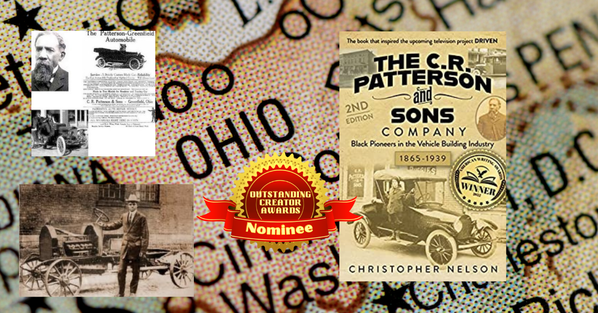|
Score: 94/100 (9.4 out of 10)
The C.R. Patterson and Sons Company is a historical, biographical book that documents the remarkable, exceptional lives of the Patterson family—a Black family that founded one of America's first automobile companies in the late 19th and early 20th century. Just think about that for a second: a Black family in the 1800s founded a business in the slave-owning American south. That's astonishing and inspiring! This really is the perfect book to showcase on Black History Month. As touched on before, the C.R. Patterson and Sons Company was founded by Charles Richard Patterson in Greenfield, Ohio in 1865. It's so amazing to see the image on page 41 of Charles—a Black man—featured front and center on a business mural with his white employees. The author is quick to point out that Charles was not a slave. He was a free Black man living in the south. As fascinating as Charles is, his sons are equally interesting to read about. The one who captured our imagination the most was Frederick Douglass Patterson. Why? Because he was the first Black football player in Ohio State history. Think about that for a second: before Troy Smith, before C.J. Stroud, before Archie Griffith, before Eddie George, before Orlando Pace, before Ezekiel Elliott, there was Frederick Douglass Patterson. He apparently scored Ohio State's sixth ever touchdown and served as its first ever Black quarterback (albeit in place of the starter) and was their first Black quarterback to throw a touchdown pass! Frederick Douglass Patterson was also the third ever Black student in Ohio State history. Some sources say that he was the first, although he actually missed that by one day. Apparently, Frederick Douglass Patterson was such a national hero and figure that US President Warren G. Harding offered him the presidency of Liberia, likely recommended by another legendary figure: Booker T. Washington. C.R. Patterson and Sons Company started not as an automobile company, but rather as a carriage and wagon company. That's right, they made horse-drawn, animal-powered vehicles before the automobile was invented. So, it was a natural progression or evolution for the business. When you think about automobile manufacturers and dealers, you think of Ford or General Motors. From the Asian market, you might also think of Toyota, Honda, or Mitsubishi. However, if things were a little different—if the Great Depression hadn't happened, for example—we might be talking about Patterson vehicles! The Patterson company lasted seven decades, surviving until 1933. Something we really respect and admire about this book is that it is incredibly objective. We know that might sound strange, but it's true! This book doesn't attempt to make some big, huge, profound socio-political point. Almost every book is trying to do that these days. No, instead this book is written in the way that history SHOULD be written: with an objective lens—detailing people and events just the way they are and presenting whatever relevant information is available. If it wasn't for authors/historians like Christopher Nelson and books like this, we might not have a history. There's a reason why we know so much about ancient civilizations like Egypt, China, Persia, Israel Greece, and Rome—it's because they recorded their history for us. The thing you have to be wary of as a historian is to be wary of sensationalism. In other words, you have to identify bias. Scribes throughout history have long written sensationalized, idealized records of people and events. You really need to use your noggin and know what sounds real and what sounds made up. There's no question with this author and this book. Information is presented fairly and objectively, and when the author isn't sure about a bit of information, they'll let the reader know it. You can check this out on Amazon!
1 Comment
2/28/2023 01:29:56 pm
Thank you so much for the amazing review. I'm so glad that you received the message of the book as it was intended to be read -- facts from documented sources, refraining from bias, and a clear note of when sufficient documentary evidence was not present, but an educated conclusion was drawn. I would like to point out one item that may have been misinterpreted, C.R.'s family had left the South by the time that he started the company. He was in southern Ohio by that time. However, this company faced many obstacles typical of the post-bellum era and throughout Jim Crow policies, so their struggles were very real, and they adapted and overcame them to achieve success. Again, I can't thank you enough for the amazing review and what a wonderful way to close out Black History Month!
Reply
Leave a Reply. |
Archives
July 2024
Categories |

 RSS Feed
RSS Feed